小学五年级下册英语知识点汇总3篇
新沪教牛津版五年级下册小学英语全册单元知识点小结
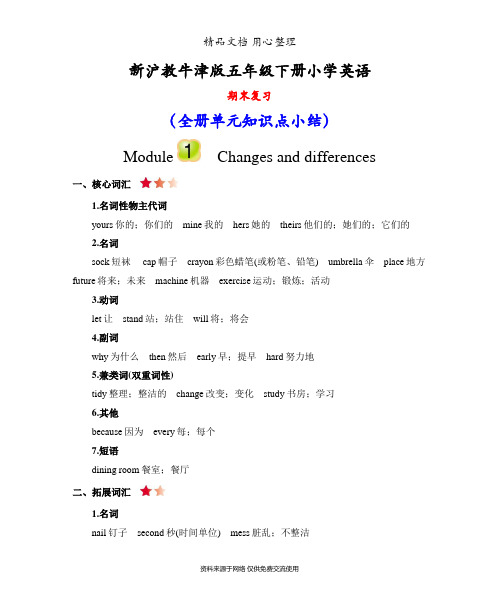
新沪教牛津版五年级下册小学英语期末复习(全册单元知识点小结)Module Changes and differences一、核心词汇1.名词性物主代词yours你的;你们的mine我的hers她的theirs他们的;她们的;它们的2.名词sock短袜 cap帽子crayon彩色蜡笔(或粉笔、铅笔)umbrella伞place地方future将来;未来machine机器exercise运动;锻炼;活动3.动词let让stand站;站住will将;将会4.副词why为什么then然后early早;提早hard努力地5.兼类词(双重词性)tidy整理;整洁的change改变;变化study书房;学习6.其他because因为every每;每个7.短语dining room餐室;餐厅二、拓展词汇1.名词nail钉子second秒(时间单位)mess脏乱;不整洁2.动词drop使落下;掉落stick粘贴;粘住3.形容词enough足够的more更多的4.副词twice两次easily容易地5.兼类词(双重词性)north北方;向北south南方;向南6.短语tidy up把……整理好(be) full of装满……;充满…… a few几个;一些wild goose大雁(复数wild geese) in the future将来in front of在……前面take a photo拍照wear glasses戴眼镜(be)weak in不擅长not … any more不再all day 一天到晚do exercise做运动三、核心句型1.— Are they yours?它们是你的?— No, they aren’t. 不,它们不是。
解读: 问句是一个一般疑问句,用来询问某物的归属,有肯定和否定两种回答。
举一反三: — Are these crayons yours?这些蜡笔是你的吗?— No, they aren’t. 不,它们不是。
小学五年级英语下册知识点总结
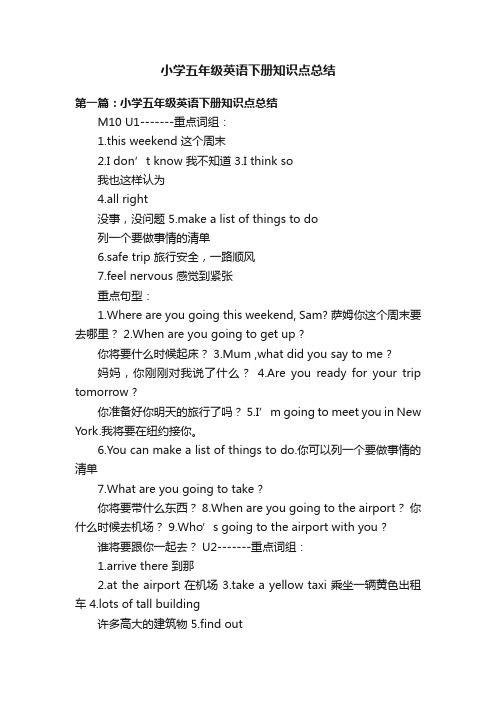
小学五年级英语下册知识点总结第一篇:小学五年级英语下册知识点总结M10 U1-------重点词组:1.this weekend 这个周末2.I don’t know 我不知道3.I think so我也这样认为4.all right没事,没问题 5.make a list of things to do列一个要做事情的清单6.safe trip 旅行安全,一路顺风7.feel nervous 感觉到紧张重点句型:1.Where are you going this weekend, Sam? 萨姆你这个周末要去哪里?2.When are you going to get up ?你将要什么时候起床? 3.Mum ,what did you say to me ?妈妈,你刚刚对我说了什么?4.Are you ready for your trip tomorrow ?你准备好你明天的旅行了吗?5.I’m going to meet you in New York.我将要在纽约接你。
6.You can make a list of things to do.你可以列一个要做事情的清单7.What are you going to take ?你将要带什么东西? 8.When are you going to the airport?你什么时候去机场?9.Who’s going to the airport with you ?谁将要跟你一起去? U2-------重点词组:1.arrive there 到那2.at the airport 在机场3.take a yellow taxi 乘坐一辆黄色出租车4.lots of tall building许多高大的建筑物 5.find out找到、发现6.a big exciting word 一个令人激动的大世界7.by plane 乘飞机8.have a party 举办一个聚会 9.sing a song唱一首歌10.play a game 玩个游戏 11.make a plan制作一个计划12.at the zoo 在动物园里 13.take lots of photos 照了许多照片重点句型: 1.I’m in New York now.我现在在纽约。
人教版小学五年级英语下册重点知识归类
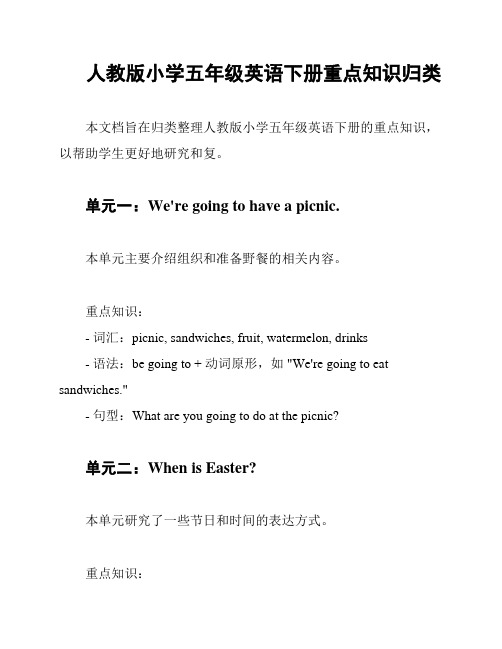
人教版小学五年级英语下册重点知识归类本文档旨在归类整理人教版小学五年级英语下册的重点知识,以帮助学生更好地研究和复。
单元一:We're going to have a picnic.本单元主要介绍组织和准备野餐的相关内容。
重点知识:- 词汇:picnic, sandwiches, fruit, watermelon, drinks- 语法:be going to + 动词原形,如 "We're going to eat sandwiches."- 句型:What are you going to do at the picnic?单元二:When is Easter?本单元研究了一些节日和时间的表达方式。
重点知识:- 词汇:Easter, Christmas, New Year's Day, Halloween- 语法:疑问词when和具体时间的表达,如 "When is Easter?"- 句型:When is Christmas?单元三:Do you want to go to a movie?本单元研究了表达意愿和邀请的相关内容。
重点知识:- 词汇:movie, park, zoo, museum, swimming pool- 语法:do you want to + 动词原形,如 "Do you want to go to a movie?"- 句型:Do you want to go to the park?单元四:Can you swim?本单元介绍了一些体育运动和能力的表达方式。
重点知识:- 词汇:swim, run, jump, skate, ride- 语法:can + 动词原形,如 "Can you swim?"- 句型:Can you ride a bike?单元五:What's the matter with you?本单元主要研究了描述身体状况和感受的表达方式。
【口袋书】人教版PEP五年级下册英语 基础知识汇总

人教版PEP五年级下册基础知识汇总Unit 1 My day.重点单词:[四会]dancing 跳舞;舞蹈exercise 活动;运动take 学习;上(课)[三会]after 在(时间)后start 开始usually 通常地;惯常地Spain 西班牙late 晚;迟a.m.午前;上午p.m.午后;下午why 为什么shop 去买东西;购物work 工作last 上一个的;刚过去的sound 听起来好像also 还;也busy 忙的need 需要play 戏剧;剧本letter 信live 居住island 岛always 总是;一直cave 山洞;洞穴win 获胜重点短语:eat breakfast 吃早饭have … class 上…课play sports 进行体育运动do morning exercises 做早操eat dinner 吃晚饭clean my room 打扫我的房间go for a walk 散步go shopping 去买东西;购物take a dancing class 上舞蹈课go swimming 去游泳start class 开始上课last night 昨天晚上after lunch 午饭以后a lot of fun 许多乐趣live on an island 住在一座岛上be good at sports 擅长体育运动字母组合cl 发/kl/ 音:clean 打扫clock 钟class 课;班级clever 聪明的clock 钟字母组合pl 发/pl/ 音:plate 盘子;碟子eggplant 茄子please 请play 玩耍;戏剧重点句型:1.询问别人什么时候做某事的问句及回答:-- When do/does + 主语+ 动词(短语)原形(+ 其他)?-- 主语(+ 频度副词)+ 动词(短语)原形/ 第三人稀单数形式+ at + 具体时间/ At + 具体时间.-- When do you get up? 你什么时候起床?-- I get up at 5 o'clock. 我5点起床。
人教版PEP小学英语五年级下册知识点汇总(最新)
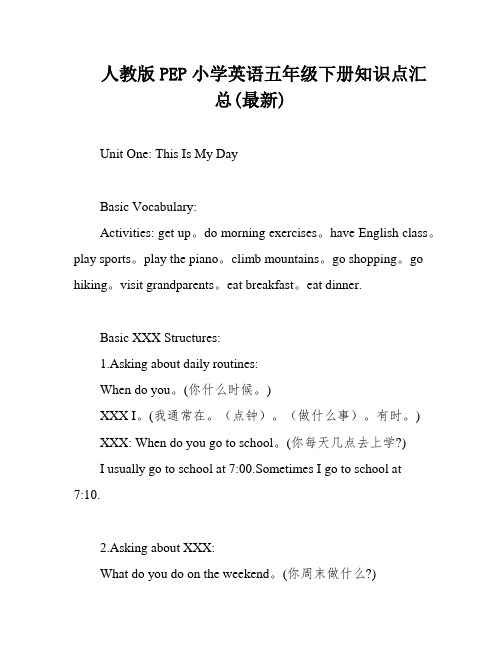
人教版PEP小学英语五年级下册知识点汇总(最新)Unit One: This Is My DayBasic Vocabulary:Activities: get up。
do morning exercises。
have English class。
play sports。
play the piano。
climb mountains。
go shopping。
go hiking。
visit grandparents。
eat breakfast。
eat dinner.Basic XXX Structures:1.Asking about daily routines:When do you。
(你什么时候。
)XXX I。
(我通常在。
(点钟)。
(做什么事)。
有时。
)XXX: When do you go to school。
(你每天几点去上学?)I usually go to school at 7:00.Sometimes I go to school at7:10.2.Asking about XXX:What do you do on the weekend。
(你周末做什么?)XXX I。
(我通常/经常。
有时。
)XXX: What do you do on the weekend?I often play XXX I go shopping with my mom.3.Introducing one's own habits:Every weekend。
I go hiking。
(我每个周末远足。
)Every day。
I do my homework at 8:00 in the evening。
(我每天晚上8点做作业。
)4.Asking XXX:What do you do。
(你是干什么的?)Time:morning。
afternoon。
evening。
noon。
at night。
6:00.on Sunday。
湘鲁版小学英语五年级下册知识点总结汇总.docx

五年级下册知识点汇总Unit 1 What subjects do you study?你学习哪些科目?subject 科目Science 科学Monday 星期一Tuesday 星期二Wednesday 星期三Thursday 星期四Do you have Science?你们有科学课吗?Yes, we do. We have Science on Wednesdays.是的,我们有。
我们在星期三上科学课。
Unit 2 We have Art in the art room・我们在画室上美术课。
exercise锻炼sing唱歌study学习Friday星期五Saturday星期六Sunday星期日We usually study Chinese and English in this classroom.我们通常在这间教室学习中文和英语。
We exercise on the playground on Fridays.星期五我们在操场锻炼。
We have Science in the science lab.我们在实验室上科学课。
Unit 3 What time do you usually go to school?你通常什么时候去上学?get up 起床brush my teeth 刷牙wash my face 洗脸put on my clothes 穿衣月艮put on my shoes 穿鞋have my breakfast吃早餐What time do you brush your teeth?你什么时候刷牙?I usually brush my teeth at 6:40 in the morning.我通常早上6 点40 刷牙。
When do you have breakfast?你什么时候吃早餐?At 7:00 am.早上七点。
Unit 4 There is homework time.有家庭作业时间。
人教精通版五年级英语下册全册知识点总结

人教精通版五年级英语下册全册知识点总结知识点总结Unit 1 Welcome to our school!【词汇】library 图书馆borrow (向某人、从某人)借borrow books 借书meeting room 会议室have a meeting 开会welcome 欢迎meet 相遇;开会our 我们的science lab 科学实验室science lesson 科学课language lab 语言实验室English lesson 英语课we 我们have 有all 所有;全部like 喜欢very much 非常;很art club 美术(艺术)俱乐部paint a picture (用颜料)绘画music club 音乐俱乐部play the piano 弹钢琴many 许多music 音乐way 路;道路please 请also 也;同样【句型】1. We\\\\\\\\\'ll show you around our school. 我们会带你参观我们学校。
2. Look! This is our library. 看!这是我们的图书馆。
3. —Do you often come to the library?你经常去图书馆吗?—Yes. We often borrow books from the library.是的。
我们经常从图书馆借书。
4. This way, please. This is our meeting room.这边请。
这是我们的会议室。
5. Welcome to our school. 欢迎来到我们学校。
6. —How many science lessons do you have in a week?你们一周有多少实验课?—We have two. 两节。
7. —Do you like English? —Yes. We all like it.你喜欢英语吗?喜欢。
(完整版)人教版PEP五年级下册英语知识点复习总结
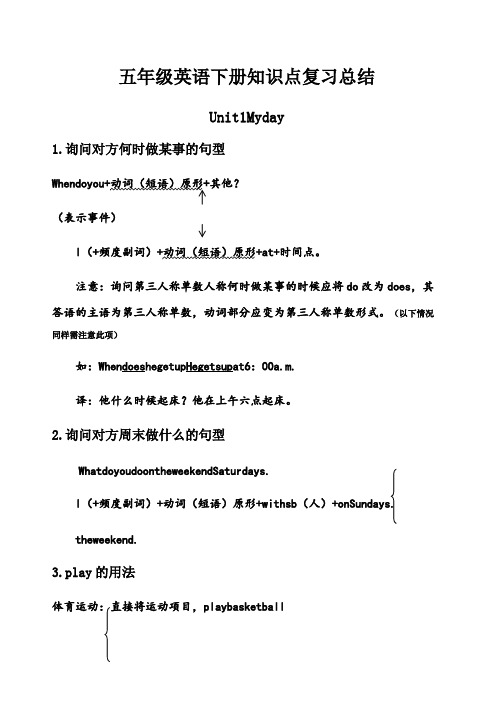
五年级英语下册知识点复习总结
Unit1Myday
1.询问对方何时做某事的句型
Whendoyou+动词(短语)原形+其他? (表示事件)
I(+频度副词)+动词(短语)原形+at+时间点。 注意:询问第三人称单数人称何时做某事的时候应将 do 改为 does,其 答语的主语为第三人称单数,动词部分应变为第三人称单数形式。(以下情况
同样需注意此项)
如:WhendoeshegetupHegetsupat6:00a.m. 译:他什么时候起床?他在上午六点起床。
2.询问对方周末做什么的句型
WhatdoyoudoontheweekendSaturdays. I(+频度副词)+动词(短语)原形+withsb(人)+onSundays. theweekend.
(2)在基数词后加 th:除去 first,second,third,其他基数词变序数词一般 直接在其后加 th。注意 five 与 twelve 要先把 ve 变 f,再加 th;eight 直接加 h;nine 去 e 再加 th。
(3)整十序数词以 ieth 结尾:整十位的序数词先将十位整数词尾的 y 变为 i, 再加 eth。如:twenty-twentieth。
The
注意:play-plays 因为 a 是元音 3)以 ch,sh,s,x 或 o 结尾的动词,在后面加-es; 例如 teach-teacheswash-washesdo-doesgo-goesfix-fixes
4)不规则的; 例如 have-has
5.by 的用法
冀教版(三起)五年级英语下册全册知识点汇总

冀教版(三起)五年级英语下册全册知识点汇总UNIT Going to Beijing一、核心词汇1.和动作相关的单词jump跳;跳跃run跑dance跳舞sing唱;演唱sit坐stand站立;直立look看;瞧see看见;明白;会见(过去式为saw) draw画cry哭;哭泣;喊叫sleep睡觉;入睡talk交谈;讨论2.和食物相关的单词tea茶water水candy糖果3.方位介词down向下;朝下;沿着up向上,在上面4.人物名词man男人woman女人baby婴儿boy男孩girl 女孩5.其他now现在who谁picture图画;照片hungry饥饿的sorry 对不起,不好意思(道歉时用)6.动词短语look at看(某人或某物) look out of从……向外看二、拓展词汇1.其他和食物相关的单词noodles面条dumplings饺子hamburger汉堡包bread面包2.其他常见时间副词yesterday昨天tomorrow明天三、核心句型1.Please don’t run! 请不要跑!解读:此句是祈使句的否定形式,表示不许做某事。
举一反三: Please don’t open the window.It’s cold outside.别开窗户,外面很冷。
Don’t speak in class.课上不要说话。
2.I want to sing! 我想唱歌!解读:此句是表达某人想做某事的句型。
举一反三: I want to visit my grandmother.我想去看望我奶奶。
She wants to go swimming.她想去游泳。
3.— Jenny, what are you doing now?詹妮,你现在正在做什么?— I am drawing a picture.我正在画画。
解读:这是询问某人正在做什么的句型。
举一反三: — What is she doing?她正在做什么?— She is watching TV.她正在看电视。
苏教版五年级英语下册各单元知识点

苏教版五年级英语下册各单元知识点Unit 1: The World of Work- Words: job, doctor, nurse, driver, farmer, teacher, cook, artist, singer, dancer, cleaner, worker.- Target language: "What does your father/mother do?" - "He/She is a doctor/teacher/farmer, etc."- Sentence patterns: What does your father/mother do? He/She is a [job].Unit 2: A Day in the Life- Words: morning, breakfast, go to school, lunch, dinner, evening, go to bed.- Target language: "What time is it?" - "It's [time]." / "Time to [verb]" - "It's time to eat breakfast/lunch/dinner, etc."- Sentence pattern: What time is it? It's [time]. / Time to [verb]. It's time to [verb] [noun], etc.Unit 3: Our World- Words: river, ocean, forest, mountain, lake, desert, island, hill.- Target language: "What can you see?" - "I can see a [noun]."- Sentence pattern: What can you see? I can see a [noun].Unit 4: Our School- Words: classroom, library, playground, canteen, gym.- Target language: "Where is the [place]?" - "It's [preposition] the [noun]." / "What do you do in the [place]?" - "We [verb] in the [place]."- Sentence pattern: Where is the [place]? It's [preposition] the [noun]. / What do you do in the [place]? We [verb] in the [place].Unit 5: Our Families- Words: father, mother, uncle, aunt, brother, sister, cousin, grandparents.- Target language: "Who's this?" - "This is my [relation]."- Sentence pattern: Who's this? This is my [relation].Unit 6: Our Instruments- Words: violin, piano, guitar, drums, trumpet, flute.- Target language: "Can you play the [instrument]?" - "Yes, I can./No, I can't."- Sentence pattern: Can you play the [instrument]? Yes, I can./No, I can't.。
五年级下册英语知识点整理
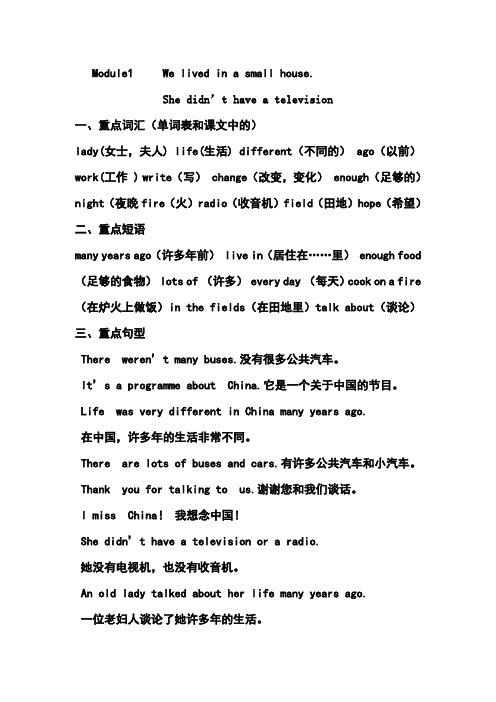
Module1 We lived in a small house.She didn’t have a television一、重点词汇(单词表和课文中的)lady(女士,夫人) life(生活) different(不同的) ago(以前)work(工作 ) write(写) change(改变,变化) enough(足够的)night(夜晚fire(火)radio(收音机)field(田地)hope(希望)二、重点短语many years ago(许多年前) live in(居住在……里) enough food (足够的食物) lots of (许多) every day (每天)cook on a fire (在炉火上做饭)in the fields(在田地里)talk about(谈论)三、重点句型There weren’t many buses.没有很多公共汽车。
It’s a programme about China.它是一个关于中国的节目。
Life was very different in China many years ago.在中国,许多年的生活非常不同。
There are lots of buses and cars.有许多公共汽车和小汽车。
Thank you for talking to us.谢谢您和我们谈话。
I miss China!我想念中国!She didn’t have a television or a radio.她没有电视机,也没有收音机。
An old lady talked about her life many years ago.一位老妇人谈论了她许多年的生活。
She couldn’t read or write. 她不会读也不会写。
四、自然拼读ai,ay /ei/ rain play al,au /ɔ: / walk autumn ar/ɑ:/ farmer party ar/ɔ:/ warm quarter五、背诵重点:课文第二部分六、语法点:过去式Module 2 She learnt English.Mr Li was a teacher.一、重点词汇learnt 学习(learn的过去式) foreign(外国的) studied 学习(study的过去式) language(语言) taught 教,讲授(teach 的过去式) wrote 写(write的过去式) dancer(舞蹈演员) hard (努力地)二、重点短语Foreign language(外语) learn English(学习英语) make a cake(做蛋糕)twenty years ago(二十年前)in his class(在他班里) a good pupil(一个好学生) an English teacher(一位英语老师) walk to school(步行去上学) by school bus(乘坐校车)三、重点句子Did she learn any foreign language她学过外语吗But he’s learning English now.但是他现在正在学习英语。
小学五年级英语知识点(3篇)

【导语】知识点是知识、理论、道理、思想等的相对独⽴的最⼩单元。
以下是整理的《⼩学五年级英语知识点(3篇)》相关资料,希望帮助到您。
【篇⼀】⼩学五年级英语知识点 ⼀、主要单词: do morning exercises 晨练,做早操 eat breakfast吃早饭 have English class上英语课 play sports进⾏体育活动 eat dinner吃晚饭 eat lunch吃午饭 climb mountains 爬⼭ go shopping购物,买东西 play the piano 弹钢琴 visit grandparents 看望(外)祖⽗母 go hiking去远⾜ ⼆、主要句⼦: When do you eat dinner?你什么时候吃晚饭? I eat dinner at 7:00 in the evening. 我晚上七点吃晚饭。
When do you get up? 你什么时候起床? I usually get up at 12:00 at noon.我通常在中午12点起床。
What do you do on the weekend?你在周末⼲什么? Usually I watch TV and go shopping. 我通常看电视和购物。
Sometimes I visit my grandparents.有时候我去看望我的外祖⽗母。
I often play football. 我经常踢⾜球。
Sometimes I go hiking.有时候我去远⾜。
三、同义词 eat breakfast—have breakfast eat lunch—have lunch eat dinner—have dinner play sports—do sports usually—often 复数形式:policeman—policemen policewoman—policewomen 现在分词:tell—telling 三单:say—says 同义句:What do you do ? ---What are you? 你是⼲什么的? 四、表⽰频度的副词:always 总是,⼀直 usually 通常,常常 often 经常 sometimes 有时候 五、以复数形式出现的词组:visit grandparents plant trees 六、介词后跟表⽰时间的词语时,表⽰在某年、某⽉、某个季节,某个时候(在上午,在下午,在晚上)⽤in;表⽰在某⼀天,在星期⼏⽤on,在具体的⼏点⼏分⽤at. 七、too 和either的⽤法区别:too和either都是“也”的意思,但too⽤于肯定句,either⽤于否定句。
人教版五年级英语下册全册知识点总结
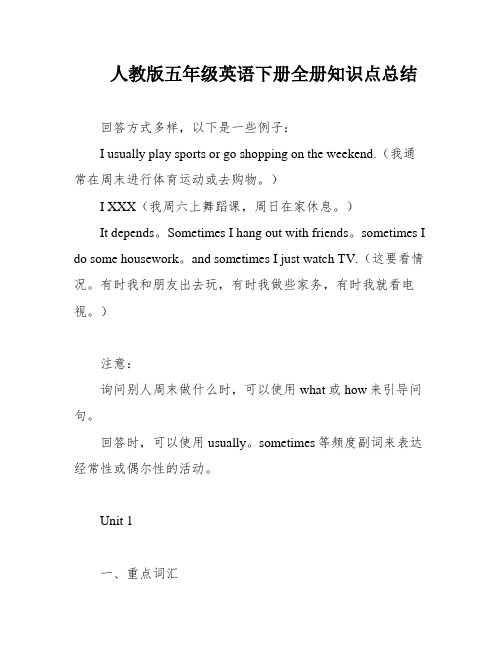
人教版五年级英语下册全册知识点总结回答方式多样,以下是一些例子:I usually play sports or go shopping on the weekend.(我通常在周末进行体育运动或去购物。
)I XXX(我周六上舞蹈课,周日在家休息。
)It depends。
Sometimes I hang out with friends。
sometimes I do some housework。
and sometimes I just watch TV.(这要看情况。
有时我和朋友出去玩,有时我做些家务,有时我就看电视。
)注意:询问别人周末做什么时,可以使用what或how来引导问句。
回答时,可以使用usually。
sometimes等频度副词来表达经常性或偶尔性的活动。
Unit 1一、重点词汇吃早餐:eat breakfast 上······课:have。
class进行体育运动:play sports做早操:do morning exercises 打扫我的房间:clean my room 去购物:go shopping舞蹈:dancing上午:a.m.通常地:usually二、其他日常活动起床:get up上床睡觉:go to bed活动,运动:exercise吃晚饭:eat XXX散步:go for a walk研究,上(课):XXX上舞蹈课:take a dancing class下午:p.m.吃午饭:eat XXX洗脸:XXX洗我的衣服:XXX看电视:watch TV打乒乓球:play ping-pong弹琵琶:play the pipa去游泳:go swimming去跑步:go running做作业:do homework练武术:do XXX踢足球:play football打篮球:play basketball三、语音cl→ [cl]:clean。
(完整版)人教版小学PEP英语五年级下册知识点归纳

人教版小学PEP英语五年级下册知识点归纳PEP五年级英语下册各单元知识点Unit 1 My day一、重点词汇。
1.四会词汇:eat breakfast 吃早饭 have···class 上······课play sports 进行体育运动exercise 活动;运动 domorning exercises做早操eat dinner吃晚饭clean my room 打扫我的房间go shopping 去买东西;购物go for a walk 散步take学习;上(课) dancing跳舞;舞蹈 take a dancing class 上舞蹈课2. 三会词汇:when什么时候after 在(时间)后start 开始usually 通常地;惯常地Spain 西班牙late 晚;迟 a.m. 午前;上午 p.m. 午后;下午why 为什么shop 去买东西;购物work 工作last 上一个的;刚过去的sound 听起来好像also 还;也busy 忙的 need 需要play 戏剧;剧本letter 信live 居住island 岛always 总是;一直cave 山洞;洞穴go swimming 去游泳 win 获胜二、其他日常活动。
get up起床 eat lunch吃午饭 go to bed 上床睡觉wash my face洗脸 wash my clothes 洗我的衣服 watch TV看电视play ping-pong打乒乓球 playthe pipa弹琵琶 go swimming去游泳go running去跑步 do homework 做作业 do kung fu练武术play football踢足球 play basketball打篮球三、频度副词。
always总是,一直(100%) usually通常(80%)often 经常(60%) sometimes(30%)有时四、疑问词。
人教版小学英语五年级下册各单元知识点

人教版小学英语五年级下册各单元知识点Unit 1: My dayIn this unit, students learn to talk about their daily routines and the time in English. They also learn to express their likes and dislikes about different activities.Some of the key vocabulary words and phrases include:- Get up- Have breakfast- Go to school- Have lunch- Have dinner- Watch TV- Play games- Read books- Do homework- Brush teeth- Go to bedStudents are introduced to the verb "to be" and learn how to make simple sentences with it, such as "I am happy" or "He is tired". They also practice asking and answering questions using "what", "when", and "where".Unit 2: Colors and clothesIn this unit, students learn to identify and name colors, clothing items, and accessories in English. They also learn to describe their own clothing and what they are wearing.Some of the key vocabulary words and phrases include:- Red- Blue- Green- Yellow- Orange- Purple- Pink- White- Black- T-shirt- Dress- Pants- Skirt- Shoes- Socks- Hat- Bag- SunglassesStudents learn about the use of prepositions such as "on", "in", and "under" to describe clothing and daily routines. They also practice using adjectives to describe colors and clothing, and learn to ask and answer questions such as "What color is your shirt?" and "What are you wearing today?"Unit 3: Food and drinksIn this unit, students learn to talk about different types of food and drinks in English. They also learn about healthy eating habits and meal times.Some of the key vocabulary words and phrases include:- Pizza- Sandwich- Rice- Noodles- Salad- Fruit- Vegetables- Juice- Milk- Water- Breakfast- Lunch- Dinner- SnackStudents learn about the use of countable and uncountable nouns when talking about food and drinks. They also practice using the articles "a", "an", and "the" correctly. They learn to express likes and dislikes about different foods and drinks using the verb "to like" and "to dislike".Unit 4: Holidays and festivalsIn this unit, students learn about different holidays and festivals celebrated around the world. They learn to talk about the traditions, customs, and symbols associated with these celebrations.Some of the key vocabulary words and phrases include:- Christmas- Easter- Halloween- New Year- Valentine's Day- Thanksgiving- Dragon Boat Festival- Mid-Autumn Festival- Lantern Festival- Traditions- Customs- Symbols- FireworksStudents learn to ask and answer questions about holidays and festivals. They learn to use vocabulary related to greetings, gifts, and decorations. They also practice using the verb "to celebrate" to talk about different celebrations.Unit 5: Animals and petsIn this unit, students learn about different types of animals and pets. They learn to describe their appearance, behavior, and habitat. Some of the key vocabulary words and phrases include:- Dog- Cat- Fish- Bird- Rabbit- Hamster- Snake- Monkey- Elephant- Tiger- Giraffe- Zoo- Forest- Sea- SkyStudents learn to use adjectives to describe animals, such as "cute", "fierce", or "big". They practice asking and answering questions about pets and their owners, and learn about basic pet care and responsibilities.Unit 6: Weather and seasonsIn this unit, students learn to talk about different types of weather and the four seasons. They learn to express their preferences and activities associated with each season.Some of the key vocabulary words and phrases include:- Sunny- Cloudy- Rainy- Snowy- Windy- Spring- Summer- Fall/Autumn- Winter- Sun- Rain- Snow- Leaves- FlowersStudents learn to use verbs to describe weather and activities, such as "to swim" or "to play snowballs". They also practice using simple present tense to make statements and ask questions. They learn to use adjectives to describe weather, such as "beautiful", "hot", or "cold".Unit 1: My dayIn this unit, students will be introduced to the basic vocabulary and phrases related to their daily routines and the time.The teacher can start by asking students when they usually wake up, and elicit the verb "to get up". Then, the class can work on making sentences like "I get up at 7 o'clock in the morning" or "He gets up early". The teacher can also introduce basic adverbs of frequency, such as "always", "usually", "sometimes", and "never".The class can then move on to discussing meals, such as breakfast, lunch, and dinner. Students can practice using the verb "to have" to describe what they eat and drink, such as "I have cereal and milk for breakfast" or "She has a sandwich for lunch". They can also learn to talk about their favorite foods and drinks, and use expressions like "I like" or "I don't like".The teacher can also introduce basic verbs related to daily activities, such as "to go", "to come", "to watch", "to play", "to read", and "to do". Students can learn to make sentences like "I go to school by bus" or "He plays games after school". The teacher can also teach prepositions of place, such as "at", "in", and "on", todescribe daily routines in more detail.Finally, the class can practice telling time in English, using both the 12-hour and 24-hour clock formats. Students can work on making sentences such as "It's 7 o'clock" or "It's half past nine". Unit 2: Colors and clothesIn this unit, students will learn to identify and name different colors, clothing items, and accessories.The teacher can start by introducing basic colors, such as red, blue, green, yellow, and so on. Students can practice using colors to describe different objects, such as "a red car" or "a blue shirt". The class can also work on making sentences like "I like wearing green clothes" or "She has a pink bag".Next, the teacher can introduce different types of clothing, such as T-shirts, dresses, pants, skirts, shoes, socks, hats, and bags. The class can learn to use prepositions of place to describe clothing, such as "on", "in", or "under". For example, "I wear my T-shirt under my jacket" or "She puts her shoes in the closet".The class can also learn about different accessories, such as sunglasses, watches, and jewelry. Students can practice using vocabulary to describe accessories, and make sentences like "He wears a watch on his wrist" or "She likes wearing earrings". Finally, the teacher can introduce the concept of describing what someone is wearing. The class can practice using adjectives to describe clothing, such as "casual", "formal", or "fancy". They canalso practice asking and answering questions about each other's outfits, such as "What are you wearing today?" or "Do you like my shirt?"Unit 3: Food and drinksIn this unit, students will learn about different types of food and drinks, and healthy eating habits.The teacher can start by introducing basic food vocabulary, such as pizza, sandwich, noodles, salad, fruit, and vegetables. Students can practice using the verb "to have" to describe what they eat and drink, and learn to make sentences like "I have a banana for breakfast" or "She has a salad for lunch".The class can also learn about different types of drinks, such as juice, milk, and water. They can practice using vocabulary to describe drinks and make sentences like "He drinks orange juice in the morning" or "She likes drinking milk before bed".Next, the teacher can introduce vocabulary related to meal times, such as breakfast, lunch, dinner, and snack. The class can learn to use the correct articles "a", "an", and "the" when talking about food and drink, and practice making sentences like "I have an apple for a snack" or "We eat dinner at 6 o'clock".Finally, the class can learn about healthy eating habits, such as eating fruits and vegetables, and drinking enough water. They can practice expressing likes and dislikes about different foods and drinks using the verbs "to like" and "to dislike", and learn to make sentences like "I like apples but I dislike broccoli".Unit 4: Holidays and festivalsIn this unit, students will learn about different holidays and festivals celebrated around the world.The teacher can start by asking students if they celebrate any special holidays or festivals, and elicit different types of celebrations. Then, the class can learn about some of the most common holidays and festivals, such as Christmas, Easter, and Halloween, and discuss their traditions and customs.Next, the class can learn about different traditions and symbols associated with holidays and festivals from different cultures. For example, they can learn about the dragon boat festival in China, the mid-autumn festival in Vietnam, and the lantern festival in Japan.The teacher can also introduce vocabulary related to greetings, gifts, and decorations. Students can practice making sentences like "I gave my mom a card for Mother's Day" or "We decorate the Christmas tree with ornaments". The class can also practice using the verb "to celebrate" to talk about different celebrations.Finally, the class can learn about how holidays and festivals are celebrated in different countries and cultures. They can learn about different foods, costumes, and activities associated with each celebration.Unit 5: Animals and petsIn this unit, students will learn about different types of animals andpets.The teacher can start by asking students what animals they like or dislike, and elicit different types of animals. Then, the class can learn to identify and name different animals, such as dogs, cats, fish, birds, and so on.Next, the class can learn about different types of pets, such as dogs, cats, hamsters, and rabbits. They can practice using vocabulary to describe pets and make sentences like "I have a dog named Max" or "She likes to play with her cat".The teacher can also introduce vocabulary related to animal behavior, such as "cute", "fierce", or "friendly". The class can learn to use adjectives to describe animals, and practice making sentences like "The tiger is fierce but the bunny is cute".Finally, the class can learn about basic pet care and responsibilities. They can learn about feeding, grooming, and playing with pets, and practice making sentences like "I walk my dog every evening" or "She cleans her fish tank every week".Unit 6: Weather and seasonsIn this unit, students will learn to talk about different types of weather and the four seasons.The teacher can start by asking students what their favorite season is, and elicit different types of seasons. Then, the class can learn to identify and name different types of weather, such as sunny, cloudy, rainy, and snowy.Next, the class can learn about the different activities and events associated with each season. For example, they can learn about swimming and camping in the summer, apple picking and Halloween in the fall, skiing and ice skating in the winter, and gardening and Easter in the spring.The teacher can also introduce basic verbs related to weather and activities, such as "to swim", "to play", or "to ski". Students can practice making sentences like "I swim in the lake on hot days" or "She skis with her family in the winter".Finally, the class can learn to express their preferences and dislikes about each season, using expressions like "I love spring because of the flowers" or "I don't like winter because it's too cold". They can learn to use adjectives to describe weather, such as "beautiful", "hot", or "cold", and practice asking and answering questions using simple present tense.。
英语五年级下册知识点整理

译林新版小学五年级下册知识点整理Unit 1知识点一、单词:because 因为 fairy 仙女 fit 合适,合身have to 不得不,必须 leave…behind 留下,丢下mushroom 蘑菇 prince 王子 understand 明白,理解pick 摘,拾 take off 脱下 be bad for有害的clothes 衣服 let 让 put on 穿上 before 在…以前try on 试穿 late 迟的 pick 摘二、词组:at the prince’s house 在王子的房子 be sad 伤心go to the party 去聚会 don’t have any nice clothes or shoes没有漂亮的衣服或鞋子come back 回来 have a good time 过得愉快at the party 在聚会 take off 脱下 try on 试穿 have to go必须走leave…behind 留下,丢下 in the forest 在深林里under a tree在一棵树下 pick a big red mushroom摘一个大红色的蘑菇look so nice 看起来很漂亮 are bad for us 对我们有害的三、句型:Why are you so sad 你为什么这么伤心Because I can’t go to the party. 因为我不能去参加聚会;Why 为什么Because I don’t have any nice clothes and shoes.因为我没有漂亮的衣服或鞋子;四、语法:c an’t = can not don’t =do notUnit 2知识点一、单词:far from 离……远 near 在……附近 by …乘……bus 公共汽车 ,大巴士 on foot 步行 metro 地铁taxi 出租车,的士 bike自行车 plane 飞机 ship轮船train 火车 ride 骑车 show 给……看 basket 篮子city城市二、词组:your new home 你的新家 very big 很大 far from school 离学校远live on Moon Street 住在月亮街上near City Library在城市图书馆附近 come to school 来学校by bus 乘公共汽车 on foot 步行by metro 乘地铁by taxi 乘出租车 a taxi driver 一位出租车司机in the park 在公园里 can fly 会飞 show his bike to sam 展示他的自行车给山姆看too young 太小年龄 sit in the basket 坐在篮子里三、句型:Where do you live 你住在哪里I live…我住在…… I live near/ far from…我住在附近/离远How do you come to school 你怎样来学校的I come to school…我来学校……Unit 3知识点一、单词:along 沿着,顺着 ask the way 问路ask…for help 向……求助full 满的,饱的 get to 到达 next to 在……旁边on your right 在你的右侧; See you later. 一会儿见; traffic light交通灯 turn left向左转 turn right 向右转bookshop 书店 get off 下车 get on 上车take 搭乘 walk 走;步行 street 街道 excuse me劳驾;对不起cinema 电影院 hospital医院 shop商店 zoo动物园supermarket超市 stop车站 over结束二、词组:want to visit 想要参观 get to 到达 get on上车 get off 下车at Park Station在公园站 walk to 走到 next to 在……旁边on the street 在街上 come out from从……出来ask a policeman for help 向一位警察求助 go along this street 沿着这条街走 on your right 在你的右侧 see a new film 看一部新电影wait for the bus 等公交车 take the metro 乘地铁 be over 结束at the traffic lights 在交通灯 turn left向左转 turn right 向右转三、句型:How do I get to …我怎样到达……Go along this street.沿着这条街走;Turn left /right at the traffic lights. 在交通灯向左/右转;Get on/ off …at …在……上/下车;You can see the bookshop on your right.你可以看见书店在你的右手侧;Unit 4知识点一、单词:see the doctor 看医生 feel 感觉 toothache 牙疼 anything 任何东西bedtime 就寝时间 check 检查 dentist 牙医 giraffe 长颈鹿have a rest 休息 point at 指着,指向 should 应该brush one's teeth 刷牙 drink water 喝水take medicine 吃药neck 脖子二、词组:see the doctor 看医生 have a headache 头痛 feel cold 感觉冷let me check 让我检查 have a fever 发烧 have a rest 休息at home 在家 take some medicine 吃些药drink some warm water 喝些温水 eat a lot of sweets 吃许多糖see the dentist 看牙医 too many sweets 太多糖before bedtime 在就寝时间以前 brush your teeth 刷牙三、句型:What’s wrong with ………怎么了I /They have a fever/headache…我/他们发烧/头痛……He / She has a cold/ toothache…他/她感冒/牙痛……What should … do……应该怎么做… should have a rest. …应该休息;四、语法:have → has 三单 shouldn’t = should not tooth → teethUnit 5知识点一、单词:parent 父或母 clean 擦,洗 cook 烧,煮 busy 忙的go away 走了,离开 ladybird 瓢虫 make the bed 整理床铺pest 害虫 sweep the floor 扫地 wash the dishes 洗碗grow 种植 garden 花园 sweet 甜的二、词组:Saturday morning 周六早上 clean the car 擦车 help him 帮他cook breakfast 做早饭 in the kitchen 在厨房 sweep the floor 扫地make the bed 整理床铺cook dinner 做晚饭wash the dishes 洗碗clean the table 擦桌子 eat fruit 吃水果 watch TV 看电视wash clothes 洗衣服 grow grapes 种葡萄 big and sweet 又大又甜go away 走了,离开 so sweet 真甜 in the garden 在花园里三、句型:What are you/they doing 你/他们在做什么I am/They are watching TV. 我/他们在看电视;What is he /she doing 他/她在做什么He/She is sleeping. 他/她在睡觉;四、语法:现在进行时结构:Be + 动词的ing形式;do →doing三种情况:1.直接加-ing 2.双写末尾字母加ing 3.去e加ingUnit 6知识点一、单词:game 游戏,比赛 angry 生气的,愤怒的 drive... away 赶走I can't wait 我等不及了 meat猪、牛、羊等的肉potato马铃薯,土豆 spot 斑,点 tomato 西红柿vegetable蔬菜 win 获胜,赢 yummy 好吃的,美味的smell 有……气味,闻起来 look for 寻找 ready 准备好love 喜爱,喜欢 bread 面包 catch 抓,抓走二、词组:in the evening 在晚上 come home 回家 a football game 一场足球赛his parents 他的父母 smell nice 闻起来香wash some vegetables 洗些蔬菜 some tomato soup 一些西红柿汤cook meat with potatoes 肉煮土豆 I can't wait我等不及了look for 寻找 some juice 一些果汁 apple juice 苹果汁orange juice 橘子汁 a great cook 出色的厨师a lot of pests许多的害虫 come to help 来帮助 drive... away 赶走how many spots 多少个点三、句型:Are you cooking meat 你在煮肉吗No,I’m not. 不,我不是;Is he looking for some juice 他在找果汁吗No, he isn’t . 不,他不是;There is some meat/bread/juice/milk in the fridge.有些肉/面包/果汁/牛奶在冰箱里;There are some potatoes in the fridge. 在冰箱里有些土豆;四、语法:there be 句型中, be动词的形式要看他后面所跟的名词;若是名词单数/不可数名词,则用is;可数名词复数,则用are;tomato -→tomatoes potato -→ potatoesUnit 7知识点一、单词:Chinese New Year 中国农历新年 Double Ninth Festival 重阳节dragon boat race 赛龙舟 Father's Day 父亲节get together 团聚 Mother's Day 母亲节 rice cake 重阳糕rice dumpling 粽子 Dragon Boat Festival 端午节dumpling 饺子 February 二月 festival 节日January 一月 June 六月 May 五月Mid-Autumn Festival 中秋节 moon cake 月饼 mountain山,山脉November 十一月 October 十月 place 地方,地点September 九月 Spring Festival 春节 call 叫作,称作place 地点 old 老的二、词组:Chinese festivals 中国的传统节日 Spring Festival 春节in January or February 在一月或二月Chinese New Year 中国农历新年 get together 团聚eat dumpling 吃饺子 Dragon Boat Festival 端午节in May or June 在五月或六月 dragon boat race 赛龙舟eat rice dumpling 吃粽子 Mid-Autumn Festival 中秋节look at the moon 赏月 at night 在夜里 eat moon cake 吃月饼Double Ninth Festival 重阳节 old people 老人climb mountains 登山 eat rice cake 吃重阳糕Mother's Day 母亲节Father's Day 父亲节 at this festival 在这个节日on the second Sunday of May 在五月的第二个星期天 talk about 谈论a good idea 好主意三、句型:The Spring Festival is in January or February.春节在一月或二月;The Dragon Boat Festival is in May or June. 端午节在五月或六月;What do people du on Mother’s Day 人们在母亲节做什么四、语法:节日、月份这类专有名词单词的第一个字母都要大写:Spring Festival January;月份的英语书写可以缩写到单词的前三个字母:January→Jan.February→Feb. 特殊的September→Sept.Unit 8知识点一、单词:eighth 第八 eleventh 第十一 fight 打仗;打架fourth 第四 hero 英雄 password 密码April 四月 August 八月 birthday 生日December 十二月 July 七月 March 三月together 一起 go shopping 去购物 play 戏剧number 数字 answer 答案 start 开始二、词组:on the eleventh of May 在5月11日 on the eighth of April 在4月8日have a big dinner 吃一顿丰盛的晚餐 with our parents 和我们的父母eat some noodles 吃些面条 play with 和……玩have a great time 玩得很开心 a birthday cake 一个生日蛋糕have a party 举行聚会 at home 在家 play some games 玩些游戏have a lot of fun 玩得很开心 go shopping 去购物open the door 开门 be easy for me 对我来说很容易be good at Math 擅长数学 the first number 第一个数字start fight 开始打仗 run away 逃跑三、句型:When’s your birthday 你的生日在什么时候It’s on the the eleventh of May.在5月11日;四、语法:日期的表达方法:the 日序数词of 月如: the eleventh of May基变序,有规律;词尾加上th ; 一二三,特殊记;词尾字母tdd ,八减t ,九减e ;F要把ve替 ,Ty把 y 变成i,记住th 前有个e;语法点归纳be动词:我用am, 你用are,is连接他,她,它;单数名词用is,复数名词全用are;变疑问,往前提,句末问号莫丢弃;变否定,更容易,be后not莫忘记;疑问否定任你变,句首大写莫迟疑;1.like + 动词ing,如:like swimming2.go + 动词ing,如:go climbing3.how many +可数名词,如: how many watches4.how much + 不可数名词,如: how much water5.序数词前一定加the ,如:the first day6.在几点用at, 如 at 7 o’clock ,在某一天或某一天的具体时间段用on ,如:on Sunday, on Sunday morning, 直接在早上、下午或晚上用in,如:in the morning7.动词后代词用宾格动宾如:join me8.介词后代词用宾格介宾如:with him ,to her9.want to do sth 动词加副词动副,如: dance beautifully 15.some 用于肯定句,any 用于否定句16.There be 在某地有某物强调位置采用就近原则,如:There is a teacher and some students in the classroom.17.不可数名词有:water coffee tea milk juice bread rice food fruit paper chocolate exercise fishpeople18.乐器前加the, 球类前不加the,如:play the piano, play football 19.who当作特殊的第三人称单数;20. 现在进行时结构:Be 动词+动词ing动词变化规则:1.直接加ing , 2.去e加ing , 3.双写末尾字母加ing句型转换否定变化be动词am、is、are+not、情态动词can+ not、助动词do、does + not如何将一个肯定句改为否定句:1、看句中有无be动词,如有,直接在be动词后+ not;2、看句中有无情态动词,如有,直接在情态动词后+ not;3、如都没有,就用助动词+ not;分四个步骤:1位置:肯定句中本来是没有助动词的,要加上去,位置在主语某人或某物后,动词前;2确定助动词用do、does,根据句中动词,动词是原形的助动词就用do,动词是第三人称单数的助动词就用does,3在助动词后加not;4原句中动词发生变化就要恢复成原形;强调一点,有some的要考虑是否要用any;人称代词疑问词。
人教版英语五年级下册知识点总结

人教版英语五年级下册知识点总结一、词汇核心词汇学校生活:classroom, library, playground, office, restroom, schedule, lesson, homework, break, lunch家庭成员:family, father, mother, brother, sister, uncle, aunt, cousin日常活动:get up, go to bed, wash face, brush teeth, eat breakfast, do homework, watch TV, play computer games 食物与饮料:hamburger, hot dog, sandwich, pizza, cake, cookie, milk, juice, water拓展词汇学科名称:math, science, Chinese, English, PE, art, music 颜色与衣物:red, blue, yellow, green, white, black, shirt, pants, shoes, hat, socks动物与植物:cat, dog, fish, bird, rabbit, flower, tree, grass, leaf节假日与活动:birthday, Christmas, Spring Festival, summer vacation, winter vacation, party, picnic二、语法现在进行时表达正在进行的动作或状态。
be动词(am/is/are)+动词-ing形式。
例句:What are you doing? I am reading a book. They are playing football.一般现在时表达经常性的行为或状态。
主语为第三人称单数时,动词形式要发生改变。
例句:She always washes her hands before meals. He often watches TV in the evening.一般过去时表达过去某个时间发生的动作或状态。
五年级下册英语知识点总结

五年级下册英语知识点总结五年级下册英语知识点总结在平平淡淡的学习中,大家对知识点应该都不陌生吧?知识点是指某个模块知识的重点、核心内容、关键部分。
哪些才是我们真正需要的知识点呢?下面是店铺为大家收集的五年级下册英语知识点总结,希望能够帮助到大家。
五年级下册英语知识点总结篇1Unit 11. the first day 第一天2. the new term 新学期3. all the students 所有学生4. at school 在学校5. each other 互相6. a new building 一幢新教学楼7. a lot of rooms 许多房间8. how many 多少9. two reading rooms两间阅览室10. have a look 看一看11. go and play 去玩12. go and see. 去看看13. go and have a look 看一看14. a lot of flowers and trees 许多花和树15. good idea 好主意16. in the street 在街道上17. on the plate 在盘子里18. on the table 在桌子上句子1. Is there a garden in the school? No, there isn’t.学校里有个花园吗?不,没有。
2. Is there a reading room near the playground? Yes, there is.操场附近有个阅览室吗?是的。
3. Are there any bookcases near the window? No, there aren’t.窗子附近有一些书橱吗?不,没有。
4.Are there any pictures on the desk? Yes, there are. 课桌上有一些图片吗?是的。
5. How many TV rooms are there in the building? There are four.大楼里有几间电视房?有四间。
五年级英语下册必背知识点汇总

五年级英语下册必背知识点汇总Unit 1: My Friends- Vocabulary: Words related to family and friends, such as father, mother, sister, brother, friend, etc.- Grammar: Possessive pronouns (my, your, his, her, etc.)- Sentence patterns:- This is my friend.- Her name is Lucy.- His father is a doctor.- My sister likes to play soccer.- Dialogue: Conversations about introducing family and friends.Unit 2: My School- Vocabulary: Words related to school, such as classroom, blackboard, teacher, student, etc.- Grammar: Singular and plural nouns.- Sentence patterns:- I have a new pen.- There are many students in our school.- The blackboard is big.- Dialogue: Conversations about school life.Unit 3: My Daily Routine- Vocabulary: Words related to daily activities, such as wake up, brush teeth, eat breakfast, etc.- Grammar: Simple present tense.- Sentence patterns:- I wake up at 7 o'clock every morning.- She brushes her teeth before breakfast.- They eat lunch at 12 o'clock.- Dialogue: Conversations about daily routines.Unit 4: My Hobbies- Vocabulary: Words related to hobbies, such as swim, paint, read, etc.- Grammar: Present continuous tense.- Sentence patterns:- He is swimming in the pool.- She is painting a picture.- They are reading a book.- Dialogue: Conversations about hobbies and leisure activities.Unit 5: My Town- Vocabulary: Words related to buildings and places in a town, such as hospital, library, park, etc.- Grammar: Prepositions of place.- Sentence patterns:- The hospital is next to the school.- The library is in front of the park.- The post office is between the bank and the supermarket.- Dialogue: Conversations about different locations in a town.Unit 6: My Country- Vocabulary: Words related to countries and nationalities, such as China, Japan, American, etc.- Grammar: Be verb (am, is, are).- Sentence patterns:- I am Chinese.- He is Japanese.- They are American.- Dialogue: Conversations about different countries and nationalities.Unit 7: My Travel- Vocabulary: Words related to travel, such as plane, train, car, etc.- Grammar: Simple past tense.- Sentence patterns:- I went to Beijing last month.- She traveled to Shanghai by plane.- They visited the Great Wall.- Dialogue: Conversations about travel experiences.Unit 8: My Future- Vocabulary: Words related to future plans and aspirations, such as job, doctor, teacher, etc.- Grammar: Future tense.- Sentence patterns:- I will be a doctor in the future.- She wants to be a teacher.- They plan to travel around the world.- Dialogue: Conversations about future goals.以上是五年级英语下册的必背知识点汇总,包括词汇、语法、句型和对话等内容。
- 1、下载文档前请自行甄别文档内容的完整性,平台不提供额外的编辑、内容补充、找答案等附加服务。
- 2、"仅部分预览"的文档,不可在线预览部分如存在完整性等问题,可反馈申请退款(可完整预览的文档不适用该条件!)。
- 3、如文档侵犯您的权益,请联系客服反馈,我们会尽快为您处理(人工客服工作时间:9:00-18:30)。
小学五年级下册英语知识点汇总3篇小学五年级下册英语知识点汇总3篇1Unit1 How Are You Feeling Now?单词:1、feel感觉;感到2、happy高兴的,快乐的3、 sad 悲伤的;难过的,4、tried疲劳的5、angry生气的,愤怒的6、go out to play出去玩7、snowman雪人 8、make a snowman.堆雪人 9、why 为什么 10、because因为11、drink喝 12、make使,让 15、so因此;所以 16、tell告诉短语:1、good idea 好主意2、why not?为什么不?3、drink some water 喝点水4、on time 按时5、come on加油,来吧6、a little一点;少许句子:1.--How are you feeling now?你现在感觉怎么样?--I am feeling情绪形容词我感觉....2.You look sad.你看起来悲伤。
She/He looks sad。
她/他看起来很悲伤。
3.Because it is snowing again.因为又在下雨呢。
4.I can’t go out to play.我不能出去玩。
5.We can make a snowman. 我们可以堆雪人。
6.Sit down and drink some water.坐下,喝点水。
7.--Why is she/he angry?她/他为什么生气?--Because....因为...8.Colin is late again.This makes her very angry.Colin又迟到了,那使她非常生气。
9.So Miss White is telling him to come to school on time and not tobe late again。
因此怀特女士正在告诉他要按时到校,不要迟到。
语法:1、sth makes sb +情绪形容词某事让某人.....Unit 2 Spring is Coming!单词:1、spring,春天2、summer夏天3、 autumn秋天4、winter冬天5、 season季节6、 plant trees植树7、 ride a bike 骑自行车8、Tree Planting Day植树节 9、interesting有趣的10、March 3月11、April四月 12、May五月 13、warm 暖和的 14、hot热的15、go swimming去游泳 16、cool凉爽的 17、rich富有的;丰富的18、cold寒冷的 19、in spring 在春天重点句型:1.--What do you do in 季节? 在...你经常干什么?--I often fly kites with my friends. Sometimes we climb themountains.我经常和朋友放风筝,有时我们爬山。
2.--Which is your favorite season?那一个是你最喜爱的季节?--My favorite season is...我最喜欢的季节是....3.Spring is coming!春天到了!4.How happy we are!我们多么高兴啊!5.I plant trees with my parents every year on Tree Planting Day.每年植树节我和父母一块去植树。
6.There are four seasons in a year.一年有四个季节。
7.It’s warm and trees are green.天气很暖和,树也是绿的。
8.Summer is hot,but we can go swimming and eat ice-creams.夏天是炎热的,但是我们可以游泳和吃冰激凌。
9.Autumn is cool but rich.,We have many fruits in this season.秋天是凉爽的。
在这个季节里我们有许多水果。
10.Winter is cold.Sometimes it snows.We can make snowmen.So we feelhappy too!冬天很冷,有时下雪。
我们可以堆雪人,因此我也感到高兴。
重点知识:1、How引导的感叹句结构:How +形容词+句子主语+谓语动词+!How happy we are!我们真开心啊2、in+季节:在....季 in spring 在春天3、in+月份:在.....月 in March 在三月4、on+日期 : 在.....天 on Tree Planting Day 在植树节5、play with ...:和....玩 play with Li Shan 和李珊玩6、plant trees with....:和.....一起植树plant trees with my mother 和我妈妈一起植树7、go+v-ing :去.... go swimming:去游泳Unit3 Spring Begins from March.知识点单词:1、January一月2、February二月3、March三月4、April四月5、May五月6、June六月7、July七月8、 August 八月9、 September九月10、 October十月 11、 November十一月 12、 December 十二月12、which那一个 13、become变成;变得 14、better 更好15、Christmas Day圣诞节 16、New Year新年 17、each 每;每个18、month月份 19、first第一 20、second第二 21、third第三22、fourth第四 23、fifth第五 24、sixth第六 25、seventh第七26、eighth第八 27、ninth第九 28、eleventh第十一29、twelfth 第十二短语:1、from...to..从...到...2、begin from 从...开始3、like...better 更喜欢....4、like ...best 最喜欢....5、together with sb(宾格)与某人在一起句子:1.How many months are there in a year?一年有几个月?2.How many months are there in a season?一季有几个月?3.Which months are in spring? 哪些月份在春天?4.---Which is your favorite season/month ? 哪一个是你最喜欢的季节/月份?---My favorite season/month is ...我最喜爱的季节/月份是...5. Autumn begins from September here.这儿秋天从九月开始。
6. It is cool and the mountains become very beautiful.天气很凉爽,山变得非常漂亮。
7. The trees become red and yellow.树变成了红色和黄色。
8. I like winter better.我更喜欢冬天。
9. Summer is from June to August。
夏天从六月到八月。
10. We can have much good time together with our family and friends. 我们和家人朋友在一起玩得开心。
11. We have Christmas on December 25th and New Year on January 1st。
我们12月25日有圣诞节,1月1日有元旦。
12. Each season has three months.每个季节有三个月。
13. New Year is in the first month of the year.新年是一年当中的第一个月。
14.---When is the Children’s Day?.儿童节在什么时候?---Children’s Day is on .....儿童节在....语法:1、the first 第一 the second 第二序数词前要加the2、Each +(名词单数)+ has .....each后跟名词单,谓语动词用单三。
3、spring-- March三月、April四月、May五月4、summer--June六月、July七月、 August八月5、autumn--September九月、October十月、 November 十一月6、 winter---December 十二月、January一月、February二月7、年、月、季节前面用in,节日和具体日期前用on。
Unit4 He lives in a village 知识点单词:1、village村庄;乡村2、bird小鸟3、snake蛇4、potato,土豆(potatoes) 5、tomato(tomatoes)西红柿 6、 river 河流 7、 lake湖泊8、kind种类 9、around到处;围绕 10、sound听起来 11、by从...旁边12、grow种植;生长 13、other其他的;别的 14、wild野生的15、even甚至 16、happily愉快地;快乐地短语:1、get to 到达、抵达2、live in 居住3、far from 远离4、many kinds of 各种各样5、runs by 流过6、wild animals 野生动物7、year after year 年复一年1.Where do you live? I live in ...你住在那里?我住在...2.Where does he/she live? He/She lives in ..他/她住在那里? 他/她住在...2.Xi‘an is really a beautiful city,西安真的是一座美丽的城市。
4. Do you live in the city? Yes, I do. No, I don’t.你住在城市吗? 是的。
/不,不是。
5. Is your village big? Yes, it is. No, it isn’t.你的村庄大吗?6.In April and May,there are many kinds of flowers around.在四月和五月,到处都是各种各样的花。
